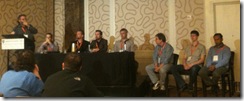
Schema.org Consensus at SemTechBiz
Day three of the Semantic Tech & Business Conference in San Francisco brought us a panel to discuss Schema.org, populated by an impressive array of names and organisations: Ivan Herman, World Wide Web Consortium Alexander Shubin, Yandex Dan Brickley, Schema.org at Google Evan Sandhaus, New York Times Company Jeffrey W. Preston, Disney Interactive Media Group Peter Mika, Yahoo! R.V. Guha, Google Steve Macbeth, Microsoft This well attended panel started with a bit of a crisis – the stage in the room was not large enough to seat all of the participants causing a quick call out for bar seats and …





